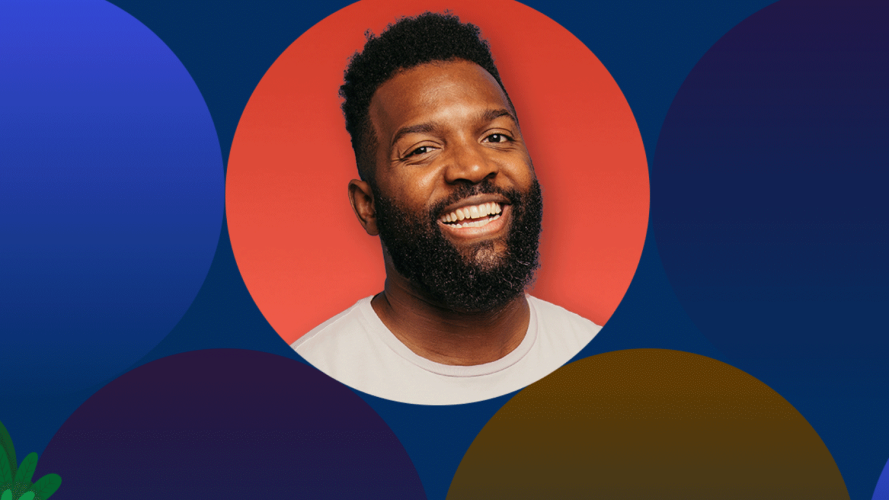Baratunde Thurston is an Emmy-nominated host who has advised the Obama White House, produced for “The Daily Show” and written the New York Times bestseller “How To Be Black.” His Ted talk was described by MSNBC’s Brian Williams as “one of the greatest TED talks of all time.” Thurston has the ability to integrate and synthesize themes of race, culture, politics, and technology to explain where our nation is and where we can take it. And, he infuses this with a levity needed when discussing difficult topics.
Thurston is also the executive producer and host of “How To Citizen with Baratunde,” where he talks about what it means to be a “citizen” in the world today — reimagining the word as a verb, to help reclaim our collective power. The podcast was named one of Apple’s favorite podcasts of 2020 and winner of the Social Impact Award at the 2021 iHeartRadio Podcast Award. He’s also the host of a new podcast from Salesforce.org and iHeartMedia, “Force Multiplier: Action Meets Impact.”
Thurston shares more on the importance of our words and how we can all drive change.
Create impact through storytelling
Baratunde Thurston: We see so much negativity in the news and I knew there was a different story happening out in the world. I’m surrounded by people working to make it better, taking action — even if they’re not solving the problems, they’re at least trying to address them. The news doesn’t seem set up to tell those stories. I felt frustrated by my inability to affect some of the things I cared about on top of the negativity of the news — so I thought, let’s make better news. Let’s speak with people who are working to make the world a better place. So with optimism, perseverance, and frustration bundled together, my wife and I created the show [“How To Citizen with Baratunde”]. Walking the talk, we created a podcast where you can find the people doing the “citizen” thing and give everyone listening something they can do, too.
What does it mean to be a “citizen”
BT: There are four principles involved: the first one is we show up and participate. The second is we invest in relationships with ourselves and with others. Increasingly, we see how “others” are not just other people, but also include other forms of life like the environment. Democracy is a relational exercise. It’s about how we live with others, especially with others who are different from us. We gave ourselves a tool to manage that difference in a relatively peaceful, nonviolent, and constructive process that was better than the alternatives. The third is we understand our power — the power of voting, of our voice, of our money, of our attention. Lastly, we must do things to benefit the many, not just the few. We have to prioritize the collective.
My mother definitely planted some of these seeds of action in me. She was a citizen in the verb sense. She would go to community vigils, write letters, educate herself, and understand herself so she could understand the world better, and she expected her children to also do things to make the world a better place — a small task, like upholding democracy.
We have to participate in our democracy in order to keep it
BT: We want to create an economy that helps us “citizen” as opposed to the opposite. The news isn’t showing people doing the work. There’s so much we aren’t hearing, and if we heard more, we’d believe more in ourselves. The framework of our nation is capitalistic. The extreme way that we’ve explored this reality — with such unreckoned inequality, racism, and exclusion — has made it harder to do all the other things that were supposed to make our country great. The next questions we need to ask ourselves are, “Can we choose to use technology to support, expand, and extend our democracy? Or will we continue to be used by technology to lose our agency, our ability to collectively decide our future? Who is doing democracy better, and who is using tech to help us ‘citizen’?”
Your words matter
BT: Primarily, our experience of the world is through the media. We comprehend reality heavily through media. We don’t tangibly interact with reality — we hear things, we read about things, someone tells you a story — we aren’t present for most things we hear about the world, but we are aware of so many things because of what we’re told. Our values are also communicated through those stories.
We perceive the world through headlines, through stories, through words, and that puts so much weight on the words we choose. How we talk about the world, shapes the world. And if we talk exclusively about victimization, if we paint a picture of some people only as negative, we will tend to have our experience of life affected by that, and probably live that version of the world because it’s all we know.
It’s why meeting an actual person that represents a group of people is often so different than what you’ve heard about. What I learned about the structure of grammar is that it can help reveal the patterns in other parts of our lives. If we acknowledge the power of language and media to shape our reality, then can we reverse-engineer reality itself? And, can we start speaking the truth that we want before it becomes reality?
The importance of mental health
BT: I prioritize my mental health by sleeping more, eating more, and cooking more. I’m focusing on feeling all parts of me. There’s a metaphor for the journey I’m on, that I hope we’re all on, which is to be our whole selves.
Specifically to Black people, I think we can work on the non-woke, informed, and trauma-inducing work missions. It’s good work, but explaining and reliving your trauma is not the only reason why we are here. If you’re a Black employee, and they tell you to bring your whole selves to work, that doesn’t mean you have to bring your trauma to work. Bring your joy to work.
Take naps. Naps are liberation in a tiny dose. Play with your kids, watch something that is not educational. Put your hands and feet in dirt and take deep breaths. We have the privilege of being alive. I try to remember with all the suffering, I am really lucky that I get to be here and experience all of this, and I can take a break.
Companies have a special opportunity, and obligation, to make an impact
BT: I understand not every company wants to take a position on every issue, but on the basic premise of a society that has allowed you to exist, you have to take a stand. If the political powers are willing to erase people’s votes, they can erase your rights. This isn’t a partisan issue — it’s an existential issue. Every company has benefited from democracy, and we need companies to take part in this, and they need to take a stand.
We need to know ourselves in order to better ourselves
Thurston dove deep into the impact the media around us has, the power of our language, and the importance of championing our own mental health. He also shared that in order to start on any of these journeys, we need to acknowledge all parts of ourselves. “The challenge I issue to our country is to acknowledge the parts of itself that it is proud of and less proud of — even the parts that it is ashamed of,” he said, “knowing our whole selves lets us be our whole selves. By doing this, we can celebrate who we are and be proud about where we can go from here.”
Commit to Equality
At Salesforce, we are committed to driving equality in our workplace as we foster a culture where employees feel valued and empowered to succeed.
































